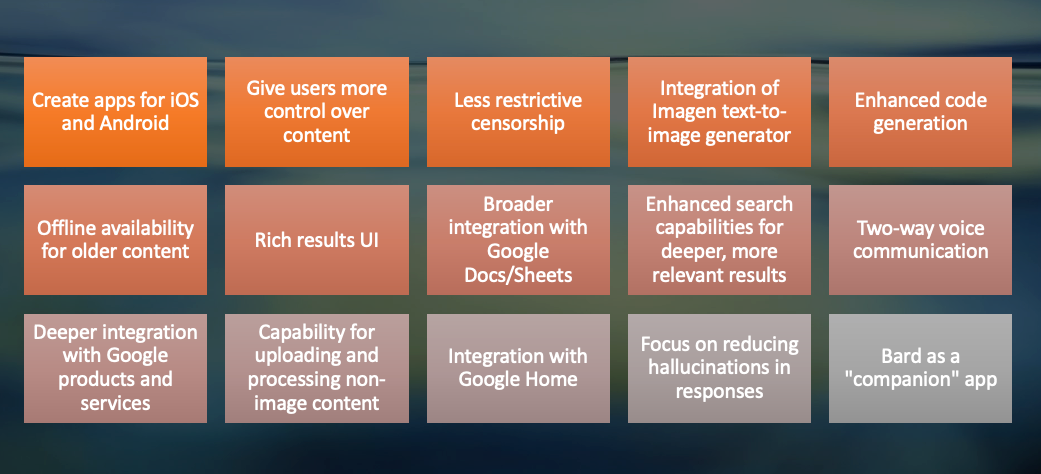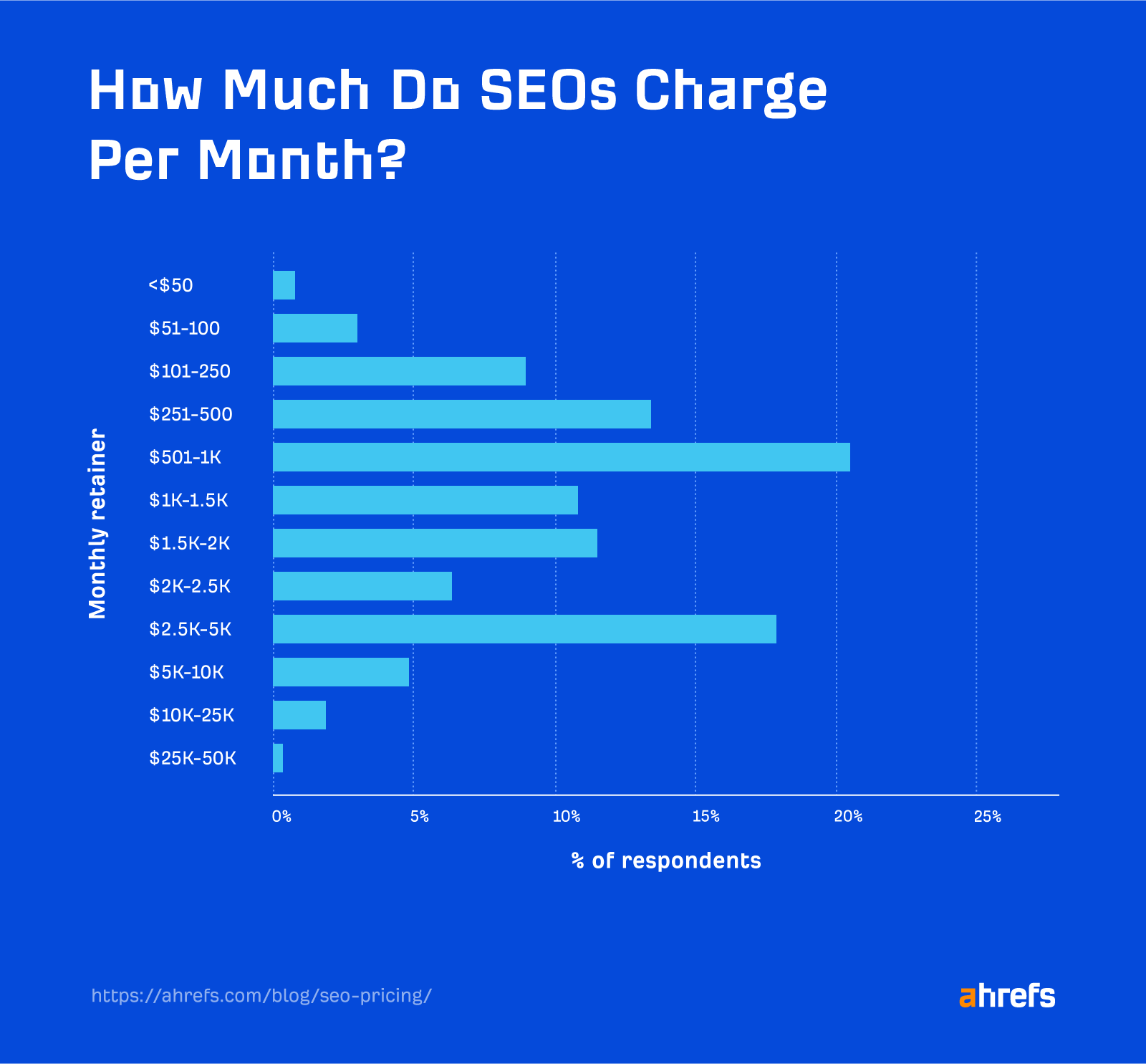Bard Wish List, SEO Pricing Survey, NYT vs. OpenAI

Bard Feature 'Wish List'
While it's clear SGE will definitely continue, Google isn't quite ready to make it generally available either. Its original December, 2023 "expiration date" has been removed though the "experiment" label remains. While there's been much speculation about SGE's coming, and probably inevitable, impact on organic traffic, it's more interesting in many ways to consider the future of Bard, which is more of an "x variable" in the Google search equation. We know basically what SGE is already, though it will continue to evolve. Bard is more of a blank canvas. To that point, a couple of days ago Chris Gorgolewski, a Bard product manager, posted a thread on Reddit asking for feature requests ("2024 Bard Wish List"). There are almost 500 comments and suggestions. Some are serious and some are more light-hearted or even flippant. Below is a selection of them, in no particular order. Keep in mind this isn't a general user survey but a Reddit thread of early adopters, developers and general nerds (used descriptively not pejoratively).

Our take:
- Many of the suggestions are effectively asking for feature parity with ChatGPT, which we can probably expect in 2024.
- There are a few references to "search." You don't get the sense that most of these users want Bard to be an immediate Google replacement.
- People are either asking for specific features relevant to their work/lives or see Bard as a general "assistant" and want a broad array of capabilities, well beyond "search."
Ahrefs SEO Pricing Survey
Ahrefs recently published a multi-country SEO pricing survey (n=400) that explores business models, fees and pricing across the industry. It's one of several such surveys in the market. Ahrefs found that most SEOs bill on a monthly retainer basis (78%), between $500 and $1,000. But a significant minority charge more than $2,000 per month. SEOs also bill hourly and on a project basis (least popular model). Hourly rates are most commonly, between $75 and $100, across countries. Project rates typically range between $2,500 and $5,000. More experienced SEOs are able to charge more, as one might expect. Agencies charge more than freelancers; and SEOs focused on individual, local markets make somewhat less than those selling their services across geographies. Rates and fees also vary by region.

Our take:
- This data is very useful for SEO price benchmarking.
- The post's author says, "My hope is that this data will help SEOs to stop undercharging for their services." But pricing transparency tends to advantage buyers and moderate price increases.
- Here are two other recent pricing surveys with similar but somewhat different findings for comparison (2021, 2023).
Copyright: NYT vs. OpenAI
This year could be quite significant legally for the tech industry. Google will face an antitrust reckoning (or two) and perhaps Apple as well. There will be more regulatory fines in Europe and privacy cases in the US. And the New York Times vs. OpenAI (filed at the end of last year) could turn out to be a major copyright case – or not. Some quickly dismiss the lawsuit, saying it's destined to fail and that training LLMs on copyrighted work is no different than a person "reading" a copyrighted work. It's not quite that simple however. The complaint is lengthy and has tons of exhibits. The essence of NYT's claim is: "Through Microsoft’s Bing Chat (recently rebranded as “Copilot”) and OpenAI’s ChatGPT, Defendants seek to free-ride on The Times’s massive investment in its journalism by using it to build substitutive products without permission or payment." However, earlier similar cases (e.g., Sarah Silverman v. Meta) have been dismissed or largely dismissed because AI outputs weren't "substantially similar" to the copied works. AI platforms also claim training LLMs on copyrighted materials is protected by "fair use," a frequent defense in copyright cases.
NYT Complaint Dec2023 by gesterling on Scribd
Our take:
- The NYT is currently involved in content licensing negotiations. A cynic would say the suit is to strengthen the company's negotiating position.
- Courts could dismiss the case under existing law, by saying the output isn't similar enough or that the AI output is new/"transformative" (part of fair use).
- This case will likely wind up before SCOTUS. And while the NYT's argument that OpenAI wants to compete with it is weak, there's something "wrong" in allowing wholesale copying of IP to build a massive, for-profit platform.
Recent Analysis
- Near Memo episode 139: The Google Review Fraud Landscape and How a Business Should Respond (with Curtis Boyd)
- Google LSAs Supercharge Duct Cleaning Scam, by Mike Blumenthal
- ICYMI: Near Media's 2023 Top Stories & Trends to Watch, by Mike & Greg
Short Takes
- Ahrefs: 6 critical elements of local landing pages.
- BrightLocal study on opening hours ranking boost.
- John Mueller: don't use AI images when photos (e.g., products) are required.
- How To Build A Future-Proofed SEO Strategy (in the AI era).
- Use the right language when creating Google Business Profiles.
- Bing adds favicons to Bing Chat/Copilot links.
- Fidelity: Twitter/X now worth $13B vs $44B at time of Musk buy.
- Why Apple's "catch-up" approach to LLMs may be more effective.
- Holiday '23: mobile up, online traffic down, shopping starts earlier.
- SMBs very concerned about loss of third party data access.
- More 2024 SEO predictions from selected experts.
Listen to our latest podcast.

How can we make this better? Email us with suggestions and recommendations.

